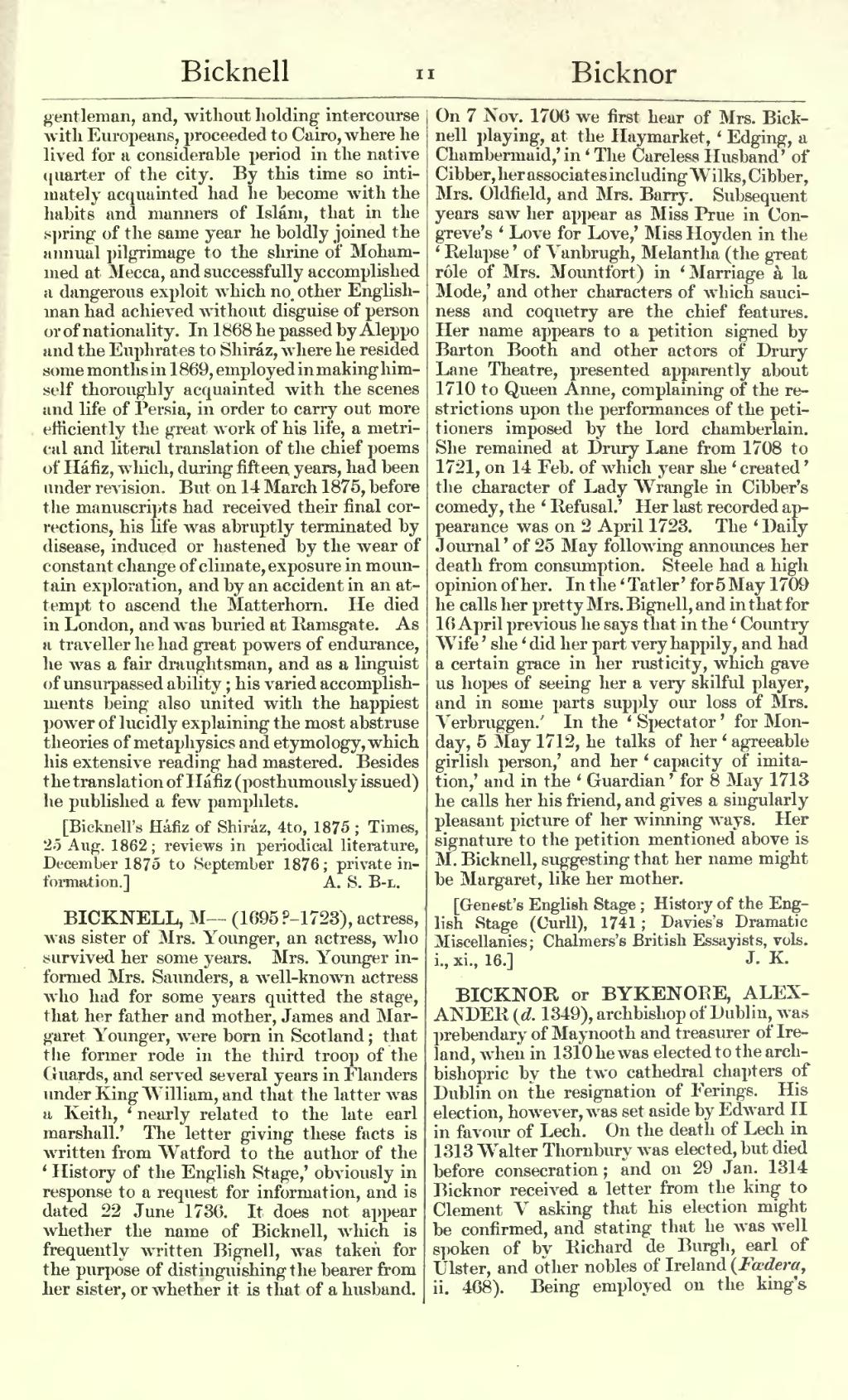gentleman, and, without holding intercourse with Europeans, proceeded to Cairo, where he lived for a considerable period in the native quarter of the city. By this time so intimately acquainted had he become with the habits and manners of Islám, that in the spring of the same year he boldly joined the annual pilgrimage to the shrine of Mohammed at Mecca, and successfully accomplished a dangerous exploit which no other Englishman had achieved without disguise of person or of nationality. In 1868 he passed by Aleppo and the Euphrates to Shiráz, where he resided some months in 1869, employed in making himself thoroughly acquainted with the scenes and life of Persia, in order to carry out more efficiently the great work of his life, a metrical and literal translation of the chief poems of Háfiz, which, during fifteen years, had been under revision. But on 14 March 1875, before the manuscripts had received their final corrections, his life was abruptly terminated by disease, induced or hastened by the wear of constant change of climate, exposure in mountain exploration, and by an accident in an attempt to ascend the Matterhorn. He died in London, and was buried at Ramsgate. As a traveller he had great powers of endurance, he was a fair draughtsman, and as a linguist of unsurpassed ability; his varied accomplishments being also united with the happiest power of lucidly explaining the most abstruse theories of metaphysics and etymology, which his extensive reading had mastered. Besides the translation of Háfiz (posthumously issued) he published a few pamphlets.
[Bicknell's Háfiz of Shiráz, 4to, 1875; Times, 25 Aug. 1862; reviews in periodical literature, December 1875 to September 1876; private information.]
BICKNELL, M— 1695?–1723), actress, was sister of Mrs. Younger, an actress, who survived her some years. Mrs. Younger informed Mrs. Saunders, a well-known actress who had for some years quitted the stage, that her father and mother, James and Margaret Younger, were born in Scotland; that the former rode in the third troop of the Guards, and served several years in Flanders under King William, and that the latter was a Keith, ‘nearly related to the late earl marshall.’ The letter giving these facts is written from Watford to the author of the ‘History of the English Stage,’ obviously in response to a request for information, and is dated 22 June 1736. It does not appear whether the name of Bicknell, which is frequently written Bignell, was taken for the purpose of distinguishing the bearer from her sister, or whether it is that of a husband. On 7 Nov. 1706 we first hear of Mrs. Bicknell playing, at the Haymarket, ‘Edging, a Chambermaid,’ in ‘The Careless Husband’ of Cibber, her associates including Wilks, Cibber, Mrs. Oldfield, and Mrs. Barry. Subsequent years saw her appear as Miss Prue in Congreve's ‘Love for Love,’ Miss Hoyden in the ‘Relapse’ of Vanbrugh, Melantha (the great rôle of Mrs. Mountfort) in ‘Marriage à la Mode,’ and other characters of which sauciness and coquetry are the chief features. Her name appears to a petition signed by Barton Booth and other actors of Drury Lane Theatre, presented apparently about 1710 to Queen Anne, complaining of the restrictions upon the performances of the petitioners imposed by the lord chamberlain. She remained at Drury Lane from 1708 to 1721, on 14 Feb. of which year she ‘created’ the character of Lady Wrangle in Cibber's comedy, the ‘Refusal.’ Her last recorded appearance was on 2 April 1723. The ‘Daily Journal’ of 25 May following announces her death from consumption. Steele had a high opinion of her. In the ‘Tatler’ for 5 May 1709 he calls her pretty Mrs. Bignell, and in that for 16 April previous he says that in the ‘Country Wife’ she ‘did her part very happily, and had a certain grace in her rusticity, which gave us hopes of seeing her a very skilful player, and in some parts supply our loss of Mrs. Verbruggen.’ In the ‘Spectator’ for Monday, 5 May 1712, he talks of her ‘agreeable girlish person,’ and her ‘capacity of imitation,’ and in the ‘Guardian’ for 8 May 1713 he calls her his friend, and gives a singularly pleasant picture of her winning ways. Her signature to the petition mentioned above is M. Bicknell, suggesting that her name might be Margaret, like her mother.
[Genest's English Stage; History of the English Stage (Curll), 1741; Davies's Dramatic Miscellanies; Chalmers's British Essayists, vols, i., xi., 16.]
BICKNOR or BYKENORE, ALEXANDER (d. 1349), archbishop of Dublin, was prebendary of Maynooth and treasurer of Ireland, when in 1310 he was elected to the archbishopric by the two cathedral chapters of Dublin on the resignation of Ferings. His election, however, was set aside by Edward II in favour of Lech. On the death of Lech in 1313 Walter Thornbury was elected, but died before consecration; and on 29 Jan. 1314 Bicknor received a letter from the king to Clement V asking that his election might be confirmed, and stating that he was well spoken of by Richard de Burgh, earl of Ulster, and other nobles of Ireland (Fœdera, ii. 408). Being employed on the king's
